Either sink or float Study guides, Class notes & Summaries
Looking for the best study guides, study notes and summaries about Either sink or float? On this page you'll find 222 study documents about Either sink or float.
All 222 results
Sort by
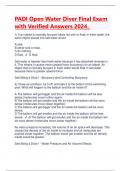 Popular
Popular
-
PADI Open Water Diver Final Exam with Verified Answers 2024.
- Exam (elaborations) • 24 pages • 2024
- Available in package deal
-
- $8.49
- 2x sold
- + learn more
1) If an object is neutrally buoyant (does not sink or float) in fresh water, the same object placed into salt water would A sink. B either sink or float. C do nothing. D float. D float. Salt water is heavier than fresh water because it has dissolved minerals in it. This means it causes more upward force (buoyancy) on an object. An object that is neutrally buoyant in fresh water would float in salt water because there is greater upward force. See Being a Diver I - Buoyancy and Control...
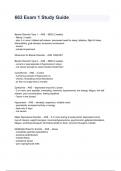 Popular
Popular
-
PADI, Open Water Diver, Final Exam Review Questions And Answers All Verified
- Exam (elaborations) • 14 pages • 2024 Popular
- Available in package deal
-
- $13.99
- 1x sold
- + learn more
PADI, Open Water Diver, Final Exam Review Questions And Answers All Verified D float. Salt water is heavier than freshwater because it has dissolved minerals in it. This means it causes more upward force (buoyancy) on an object. An object that is neutrally buoyant in fresh water would float in salt water because there is greater upward force. See Being a Diver I - Buoyancy and Controlling Buoyancy. - ANS 1) If an object is neutrally buoyant (does not sink or float) in fresh water, the...
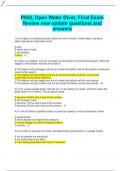
-
PADI, Open Water Diver, Final Exam Review new update questions and answers
- Exam (elaborations) • 13 pages • 2023
-
Available in package deal
-
- $11.00
- 17x sold
- + learn more
1) If an object is neutrally buoyant (does not sink or float) in fresh water, the same object placed into salt water would A sink. B either sink or float. C do nothing. D float. - D 2) I blow up a balloon, tie it off, and take it to the bottom of the swimming pool. What will happen to the balloon and the air inside it? A The balloon will get bigger and the air inside the balloon will be less dense (molecules move further apart). B The balloon will get smaller and the air inside the balloon wi...
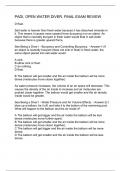
-
PADI, Open Water Diver, Final Exam Review
- Exam (elaborations) • 24 pages • 2024
-
- $13.49
- + learn more
D float. Salt water is heavier than fresh water because it has dissolved minerals in it. This means it causes more upward force (buoyancy) on an object. An object that is neutrally buoyant in fresh water would float in salt water because there is greater upward force. See Being a Diver I - Buoyancy and Controlling Buoyancy. - Answer-1) If an object is neutrally buoyant (does not sink or float) in fresh water, the same object placed into salt water would A sink. B either sink or float....
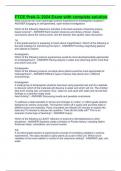
-
FTCE Prek-3- 2024 Exam with complete solution
- Exam (elaborations) • 23 pages • 2024
-
Available in package deal
-
- $12.49
- 1x sold
- + learn more
FTCE Prek-3- 2024 Exam with complete solution What would be the most meaningful science experience for kindergarten students? - ANSWER Engaging in self-generated, open-ended investigations Which of the following classroom activities is the best example of teaching inquiry-based science? - ANSWER Each student observes and draws a flower, makes conclusions about the various parts, and the teacher then guides class discussion 1st A first-grade teacher is preparing to teach about magnificati...
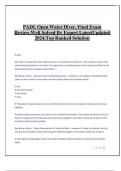
-
PADI, Open Water Diver, Final Exam Review.Well Solved By Expert LatestUpdated 2024.Top Ranked Solution
- Exam (elaborations) • 26 pages • 2024
-
- $9.49
- + learn more
D float. Salt water is heavier than fresh water because it has dissolved minerals in it. This means it causes more upward force (buoyancy) on an object. An object that is neutrally buoyant in fresh water would float in salt water because there is greater upward force. ,,, See Being a Diver I - Buoyancy and Controlling Buoyancy. - answers>1) If an object is neutrally buoyant (does not sink or float) in fresh water, the same object placed into salt water would A sink. B either sink or fl...
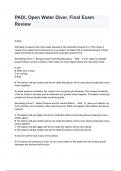
-
PADI, Open Water Diver, Final Exam Review Questions And Answers
- Exam (elaborations) • 20 pages • 2024
- Available in package deal
-
- $13.99
- + learn more
PADI, Open Water Diver, Final Exam Review Questions And Answers D float. Salt water is heavier than fresh water because it has dissolved minerals in it. This means it causes more upward force (buoyancy) on an object. An object that is neutrally buoyant in fresh water would float in salt water because there is greater upward force. See Being a Diver I - Buoyancy and Controlling Buoyancy. - ANS 1) If an object is neutrally buoyant (does not sink or float) in fresh water, the same obj...
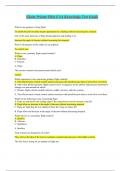
-
Gleim Private Pilot FAA Knowledge Test Guide
- Exam (elaborations) • 42 pages • 2023
-
- $17.00
- 1x sold
- + learn more
Gleim Private Pilot FAA Knowledge Test Guide Gleim Private Pilot FAA Knowledge Test Guide What is one purpose of wing flaps? To enable the pilot to make steeper approaches to a landing without increasing the airspeed. One of the main functions of flaps during approach and landing is to: Increase the angle of descent without increasing the airspeed. What is the purpose of the rudder on an airplane? To control yaw. Which is not a primary flight control surface? A. Flaps B. Stabilat...
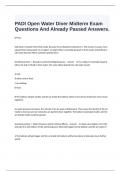
-
PADI Open Water Diver Midterm Exam Questions And Already Passed Answers.
- Exam (elaborations) • 27 pages • 2024
-
Available in package deal
-
- $10.19
- + learn more
D float. Salt water is heavier than fresh water because it has dissolved minerals in it. This means it causes more upward force (buoyancy) on an object. An object that is neutrally buoyant in fresh water would float in salt water because there is greater upward force. See Being a Diver I - Buoyancy and Controlling Buoyancy. - Answer 1) If an object is neutrally buoyant (does not sink or float) in fresh water, the same object placed into salt water would A sink. B either sink or flo...
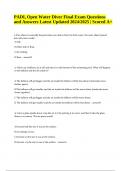
-
PADI Open Water Diver Final Exam Questions and Answers Latest Updated 2024/2025 | Scored A+
- Exam (elaborations) • 22 pages • 2024
- Available in package deal
-
- $14.99
- + learn more
PADI Open Water Diver Final Exam Questions and Answers Latest Updated 2024/2025 | Scored A+. If an object is neutrally buoyant (does not sink or float) in fresh water, the same object placed into salt water would A sink. B either sink or float. C do nothing. D float. - answerD 2) I blow up a balloon, tie it off, and take it to the bottom of the swimming pool. What will happen to the balloon and the air inside it? A The balloon will get bigger and the air inside the balloon will be less d...

$6.50 for your textbook summary multiplied by 100 fellow students... Do the math: that's a lot of money! Don't be a thief of your own wallet and start uploading yours now. Discover all about earning on Stuvia


